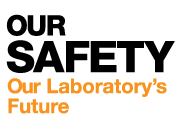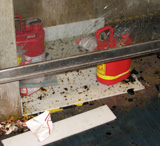



As relayed in a Level-One e-mail from Interim Director Paul Alivisatos on Monday, an explosion occurred in Building 66 on March 31 when incompatible chemicals came into contact with each other (damage is pictured above). While no one was hurt, the potential for injury was great. Some valuable lessons can be learned to help prevent a similar incident from occurring again. For example, researchers need to ensure they’ve received the proper training before working with hazardous materials, inspect waste containers for gas generation potential, and wear safety glasses and other required PPE at all times in the lab. See the “Lessons Learned” category in the “Our Safety” site for more on this accident.
Employees are reminded that Berkeley Lab Interim Director Paul Alivisatos will present a State-of-the-Lab address tomorrow at 9 a.m. in the Building 66 Auditorium. Due to limited seating in the auditorium, the address will be webcast so staff can watch on their computers. There will be a live feed to Perseverance Hall (54-0130) and video conference to 50B-4205, 90-3122, 84-0318, and JGI-149C. Alivisatos will take questions after his presentation, and those watching remotely can e-mail inquiries to [email protected] (put "SOTL" in subject line).
 Special Event: EETD Distinguished Lecture on ‘Two Billion Cars’ Monday
Special Event: EETD Distinguished Lecture on ‘Two Billion Cars’ Monday Daniel Sperling, director of the Institute of Transportation Studies at UC Davis, presents the next installment of the Environmental Energy Technologies Division’s Distinguished Lecture series on Monday, April 13, at noon in the Building 66 Auditorium. He will discuss “Two Billion Cars and What it Means for Climate and Energy Policy.” Says Sperling, sustaining this traffic load is not possible without transforming vehicles, fuels and transportation in general.
 In The News: "Lost's" Take on Free Will Makes Sense to Physicists
In The News: "Lost's" Take on Free Will Makes Sense to Physicists [Popular Mechanics] We can always count on Losts's Hurley to bring into question exactly what we're thinking. In the episode "Whatever Happened, Happened," he came through once again when he asked what should be a simple question: Does Ben (2004) remember being shot by Sayid back in 1977? Clearly, the chronology of time on the island is as perplexing to the survivors of Oceanic Flight 815 as it is to us. "Relativity messes with your idea of time," said Berkeley Lab physicist Richard Muller. "What it means to me is that time is not a single line, but [instead] has a bunch of loops in it. And things in the future in some sense have already happened. There are limits, but not everything has already happened." More>
 The Environmental Energy Technologies Division’s Mary Ann Piette, research director of the Demand Response Research Center, can be heard discussing her research on “Sustainability,” a radio show produced by Purdue’s College of Engineering. It will be heard in the Bay area on Saturday, April 25, on KQED (88.5 FM) at 1 p.m. Piette discusses automated demand response and making the electric grid smart by providing real-time information on and control over power use. Those who want to listen early can go here.
The Environmental Energy Technologies Division’s Mary Ann Piette, research director of the Demand Response Research Center, can be heard discussing her research on “Sustainability,” a radio show produced by Purdue’s College of Engineering. It will be heard in the Bay area on Saturday, April 25, on KQED (88.5 FM) at 1 p.m. Piette discusses automated demand response and making the electric grid smart by providing real-time information on and control over power use. Those who want to listen early can go here.
 In The News: Termites Rear Their Heads, But It's Not All Bad News
In The News: Termites Rear Their Heads, But It's Not All Bad News[San Diego Union-Tribune] Ah, spring! A time when the air is redolent of flowers and budding greenery, filled with the buzz and promise of new life and, uh-oh, termites. In 2007, researchers at the Joint Genome Institute announced they had sequenced and analyzed the genomes of microbes found in termite guts. That research continues at JGI and elsewhere, but progress is slow, in part because of the inherent difficulty of converting a natural digestive process operating on a microscopic scale to one capable of producing millions of gallons of biofuel. More>
 In The News: Sea Mollusks Taste Memories to Build Shells
In The News: Sea Mollusks Taste Memories to Build Shells[UC Berkeley News] UC Berkeley graduate student Alistair Boettiger, Berkeley Lab biophysicist George Oster, and a University of Pittsburgh mathematical neuroscientist have written a computer program that generates the complex patterns of seashells using simple principles developed to explain how the brain works and how memories are stored. The "neural net" model explains how mollusks build their seashells based on the finding that the mollusk's tongue-like mantle, which overlaps the edge of the growing shell, senses or "tastes" the calcium carbonate layer laid down the day before in order to generate a new layer. More>
Today at Berkeley Lab is produced by Public Affairs' Communications Department